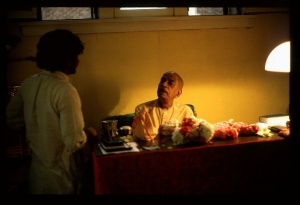SB 10.44.22-23: Difference between revisions
m (1 revision(s)) |
No edit summary |
||
| Line 1: | Line 1: | ||
{{info | {{info | ||
|speaker= | |speaker=Śukadeva Gosvāmī | ||
|listener=King | |listener=King Parīkṣit | ||
}} | }} | ||
[[Category:Srimad-Bhagavatam - Canto 10 Chapter 44]] | |||
[[Category:Bhagavatam Verses Spoken by Sukadeva Gosvami - Vanisource|104422]] | |||
<div style="float:left">'''[[Srimad-Bhagavatam]] - [[SB 10|Tenth Canto]] - [[SB 10.44: The Killing of Kamsa|Chapter 44: The Killing of Kaḿsa]]'''</div> | |||
<div style="float:right">[[File:Go-previous.png|link=SB 10.44.21]] '''[[SB 10.44.21]] - [[SB 10.44.24-25]]''' [[File:Go-next.png|link=SB 10.44.24-25]]</div> | |||
{{RandomImage}} | |||
{{SBnotice}} | |||
==== TEXTS 22-23 ==== | ==== TEXTS 22-23 ==== | ||
<div | <div class="verse"> | ||
nācalat tat-prahāreṇa | :nācalat tat-prahāreṇa | ||
mālāhata iva dvipaḥ | :mālāhata iva dvipaḥ | ||
bāhvor nigṛhya cāṇūraṁ | :bāhvor nigṛhya cāṇūraṁ | ||
bahuśo bhrāmayan hariḥ | :bahuśo bhrāmayan hariḥ | ||
bhū-pṛṣṭhe pothayām āsa | |||
tarasā kṣīṇa jīvitam | :bhū-pṛṣṭhe pothayām āsa | ||
visrastākalpa-keśa-srag | :tarasā kṣīṇa jīvitam | ||
indra-dhvaja ivāpatat | :visrastākalpa-keśa-srag | ||
:indra-dhvaja ivāpatat | |||
</div> | </div> | ||
| Line 21: | Line 27: | ||
==== SYNONYMS ==== | ==== SYNONYMS ==== | ||
<div | <div class="synonyms"> | ||
na | ''na acalat''—He (Lord Kṛṣṇa) did not move; ''tat-prahāreṇa''—because of his blows; ''mālā''—with a garland; ''āhata''—struck; ''iva''—as; ''dvipaḥ''—an elephant; ''bāhvoḥ''—by the two arms; ''nigṛhya''—seizing; ''cāṇūram''—Cāṇūra; ''bahuśaḥ''—several times; ''bhrāmayan''—whirling him around; ''hariḥ''—Lord Kṛṣṇa; ''bhū''—of the earth; ''pṛṣṭhe''—onto the surface; ''pothayām āsa''—hurled; ''tarasā''—forcefully; ''kṣīṇa''—becoming lost; ''jīvitam''—his life; ''visrasta''—scattered; ''ākalpa''—his clothing; ''keśa''—hair; ''srak''—and flower garland; ''indra-dhvajaḥ''—a tall festival column; ''iva''—as if; ''apatat''—he fell. | ||
</div> | </div> | ||
{{SBcollapse}} | |||
==== TRANSLATION ==== | ==== TRANSLATION ==== | ||
<div | <div class="translation"> | ||
No more shaken by the demon's mighty blows than an elephant struck with a flower garland, Lord Kṛṣṇa grabbed Cāṇūra by his arms, swung him around several times and hurled him onto the ground with great force. His clothes, hair and garland scattering, the wrestler fell down dead, like a huge festival column collapsing. | No more shaken by the demon's mighty blows than an elephant struck with a flower garland, Lord Kṛṣṇa grabbed Cāṇūra by his arms, swung him around several times and hurled him onto the ground with great force. His clothes, hair and garland scattering, the wrestler fell down dead, like a huge festival column collapsing. | ||
</div> | </div> | ||
| Line 35: | Line 41: | ||
==== PURPORT ==== | ==== PURPORT ==== | ||
<div | <div class="purport"> | ||
Śrīla Śrīdhara Svāmī explains the words indra-dhvaja as follows: "In Bengal, on the occasion of a certain festival, people erect a tall column in the form of a man and decorate it with flags, banners, etc. He [Cāṇūra] fell just as such a pole might fall." | Śrīla Śrīdhara Svāmī explains the words ''indra-dhvaja'' as follows: "In Bengal, on the occasion of a certain festival, people erect a tall column in the form of a man and decorate it with flags, banners, etc. He [Cāṇūra] fell just as such a pole might fall." | ||
</div> | |||
</div> | |||
</div> | </div> | ||
__NOTOC__ | |||
<div style="float:right">[[File:Go-previous.png|link=SB 10.44.21]] '''[[SB 10.44.21]] - [[SB 10.44.24-25]]''' [[File:Go-next.png|link=SB 10.44.24-25]]</div> | |||
__NOTOC__ | |||
__NOEDITSECTION__ | |||
Revision as of 11:01, 23 May 2021

A.C. Bhaktivedanta Swami Prabhupada
Please note: The synonyms, translation and purport of this verse were composed by disciples of Śrīla Prabhupāda
TEXTS 22-23
- nācalat tat-prahāreṇa
- mālāhata iva dvipaḥ
- bāhvor nigṛhya cāṇūraṁ
- bahuśo bhrāmayan hariḥ
- bhū-pṛṣṭhe pothayām āsa
- tarasā kṣīṇa jīvitam
- visrastākalpa-keśa-srag
- indra-dhvaja ivāpatat
SYNONYMS
na acalat—He (Lord Kṛṣṇa) did not move; tat-prahāreṇa—because of his blows; mālā—with a garland; āhata—struck; iva—as; dvipaḥ—an elephant; bāhvoḥ—by the two arms; nigṛhya—seizing; cāṇūram—Cāṇūra; bahuśaḥ—several times; bhrāmayan—whirling him around; hariḥ—Lord Kṛṣṇa; bhū—of the earth; pṛṣṭhe—onto the surface; pothayām āsa—hurled; tarasā—forcefully; kṣīṇa—becoming lost; jīvitam—his life; visrasta—scattered; ākalpa—his clothing; keśa—hair; srak—and flower garland; indra-dhvajaḥ—a tall festival column; iva—as if; apatat—he fell.
Translation and purport composed by disciples of Śrīla Prabhupāda
TRANSLATION
No more shaken by the demon's mighty blows than an elephant struck with a flower garland, Lord Kṛṣṇa grabbed Cāṇūra by his arms, swung him around several times and hurled him onto the ground with great force. His clothes, hair and garland scattering, the wrestler fell down dead, like a huge festival column collapsing.
PURPORT
Śrīla Śrīdhara Svāmī explains the words indra-dhvaja as follows: "In Bengal, on the occasion of a certain festival, people erect a tall column in the form of a man and decorate it with flags, banners, etc. He [Cāṇūra] fell just as such a pole might fall."